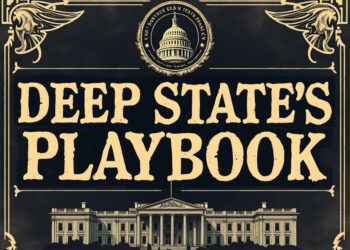In a Saturday discussion on his program War Room, Steve Bannon, alongside guests Mike Davis and Bill McGinley, delved into the implications of the Supreme Court’s recent ruling. The ruling overturned Chevron deference, marking what Bannon sees as a critical victory in the America First/ MAGA agenda to deconstruct the administrative state- each adding that, however, there is more for the WarRoom to accomplish still.
Bannon opened the discussion by celebrating the ruling as a historic achievement. “This is a monumental decision,” he declared, emphasizing the long-term significance of dismantling the administrative state.
This agenda, which Bannon said he first articulated at CPAC in 2017, has been a cornerstone of his vision for reducing government overreach. “The only way you take down the Leviathan,” Bannon said, “is to go after the administrative state.”
Davis discussed Chevron deference, a legal doctrine established in 1984 that allowed courts to defer to administrative agencies’ interpretation of ambiguous laws.
Bannon and his allies see the Supreme Court’s decision to overturn this doctrine as a major victory in their efforts to limit the power of bureaucratic agencies.
“The Chevron deference is dead,” Bannon said, noting that even far-left legal scholar Lawrence Tribe acknowledged the ruling’s significance by tweeting, “The administrative state is dead.”
The WarRoom conversation also highlighted the strategic efforts behind this judicial shift. Bannon praised figures like Neil Gorsuch, Don McGahn, and Mike Davis for their roles in this achievement.
Bannon discussed Gorsuch, now a Supreme Court Justice. He described him as instrumental in challenging the Chevron doctrine during his tenure on the 10th Circuit.
“Justice Gorsuch was the intellectual force behind this case,” Bannon noted, underscoring the careful selection of judges who would support this vision. He credited McGahn, former White House Counsel, for his foresight in compiling a list of potential justices committed to this cause.
Davis argued that the ruling would rebalance power distribution among Congress, the executive branch, and administrative agencies. “What the courts have done for 40 years is defer to these executive branch agencies,” he explained. “This decision ensures that elected officials are more accountable for laws and regulations.”
Davis criticized the reliance on expert opinions, particularly during the COVID-19 pandemic. “Hell no, we don’t need to defer to the experts,” Davis exclaimed, pointing to policies like the six-foot social distancing rule and mask mandates as examples of misguided deference.
“We saw what happened during COVID lockdowns when we deferred to the experts. They destroyed our country and so many people’s lives,” Davis said.
“This is just the beginning,” Bannon affirmed, signaling that the fight against the administrative state is far from over. The purpose of the WarRoom is to direct people to where they can make an impact on the process by understanding their political opponents’ tactics and drive.
McGinley emphasized the need for continued grassroots mobilization and strategic judicial appointments. He argued that the conservative movement must remain vigilant in appointing judges to uphold this vision. “We have a 20-year project ahead of us,” Bannon echoed, “and it’s just started with taking down the administrative state.”
In the “War Room” discussion, McGinley outlined several crucial points about the Democratic Party’s strategies and the broader political landscape.
McGinley emphasized the Democratic Party’s strategic use of fundraising. Significant funds raised at events, such as the $28 million from Radio City Music Hall and the $30 million from Hollywood, are directed into the Democratic National Committee (DNC) and state parties rather than solely Biden’s campaign. This approach supports the broader party infrastructure, making it adaptable and ready for any political shifts. “That money is actually going into the DNC and the Democratic state parties,” McGinley explained, highlighting the flexibility and power of this financial structure.
He also highlighted the party’s readiness to replace President Biden if necessary, considering high-profile alternatives like Gavin Newsom, Michelle Obama, or Oprah Winfrey. This preparation underscores the party’s focus on maintaining control and ensuring electoral success. “There is a coup going on right now, a coup against Biden,” McGinley stated, noting that the New York Times and major donors are signaling a readiness to move on from Biden if he cannot win against Trump.
McGinley contrasted this with the Republican Party’s grassroots strategy. He noted that while the Democrats invest heavily in a centralized infrastructure, the Republicans rely more on grassroots volunteers and local efforts. This grassroots approach is crucial for mobilizing voters and maintaining election integrity.
“The Democratic Party is more top-down, while the Republican Party is more of a bottom-up party,” McGinley observed, with Bannon emphasizing the importance of initiatives like the precinct strategy and volunteer mobilization.
McGinley, who later in the show recommended action items for the WarRoom audience to combat the Democrats, also addressed the significant role of dark money in supporting the Democratic Party’s goals, providing them with a resource and influence advantage. This funding mechanism allows the party to maintain a robust and flexible infrastructure. “The dark money network they’ve established is a major factor,” McGinley noted, stressing the need for Republicans to counteract this influence through grassroots efforts and strategic planning.
Overall, McGinley highlighted the Democratic Party’s sophisticated strategies and the necessity for Republicans to counteract these strategies with strong grassroots efforts.
Bannon emphasized two primary areas of focus for his audience while he is away:
1) National Security and the 25th Amendment: Bannon stressed the importance of highlighting potential national security issues and possibly invoking the 25th Amendment to address President Joe Biden’s perceived incapacity. He argued that this could lead to a constitutional crisis, which he believes should be brought to the forefront of public discourse. “We have to make that process as painful as possible,” Bannon stated, urging his audience to expose the underlying motives and mechanisms behind any attempt to replace Biden.
2) The Democratic Party’s Power Structure and Dark Money: Bannon called attention to the Democratic Party’s investment in infrastructure and the influence of dark money. He pointed out that significant funds are being channeled not directly into Biden’s campaign, but into the DNC and state parties, making it easier to replace Biden with another candidate if needed. Bannon emphasized the need to follow the money and understand the Democratic Party’s strategies. “When you see these massive fundraisers, that money is actually going into the DNC and the Democratic state parties,” he explained. This, he argued, allows the party to maintain control and adapt quickly to political opportunities.
Resources:
For more context, watch this WarRoom segment:
“The Administrative State Is Dead”: The WarRoom Celebrates Historic Victories In Supreme Court





![Bannon’s WarRoom, Show Clip Roundup 6/29/2024 [SATURDAY]](https://warroom.org/wp-content/uploads/2024/06/Steve_Bannon_at_Turning_Point_Action_Conference_2023-75x75.jpg)